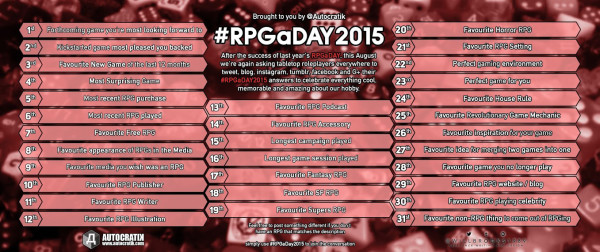Day 25 of RPGaDay asks, what is my favourite revolutionary game mechanic?
Just as I listed the other day, I would say that four revolutionary game mechanics that I really like would be: Apocalypse Engine’s task resolution system, Gumshoe’s Skill Point Spends, D&D 5e’s Advantage/Disadvantage and Savage World’s card-based Initiative system.
My favourite of these would have to be the Apocalypse Engine’s task resolution system. I’ve raved about it before, but there’s a good reason it’s being used in game after game, hacked to death in every way possible. It works.

For those of you who haven’t played an Apocalypse Engine game, it works like this: you roll 2d6, add the dice together to your stat modifier (-1 to +2 usually). Then, for each move, there’s a results table with three options: 10+, you succeed in the way you describe; 7-9, you succeed, but at a cost or not fully, usually your choice; 6-, the GM describes what happens – maybe you fail or maybe you succeed spectacularly, but put in motion a terrible disaster.
This mechanic gives you three possibilities, one which the player narrates, one which (generally) gives the player a hard choice and one which the GM narrates. There’s no default, “you fail/you succeed” paradigm that was endemic to most games up to that point. And, the best part of it, is the 7-9 result, which statistically, is the most common.
As any player of an Apocalypse Engine game will tell you, the 7-9 result is dreaded. You have to make that hard decision, do I get everything I want, but pay that high price or barely do what I set out to do and put myself in further danger? The choices for the 7-9 rolls are never easy (or rather they shouldn’t ever be) and they bring the drama alive in the game and in the player’s mind in a way that I’ve never seen a game mechanic do so simply before.
This game mechanic has revolutionized games and although many people bemoan all the Apocalypse Engine hacks, the reality is that people are adopting it widely because it is so revolutionary.

